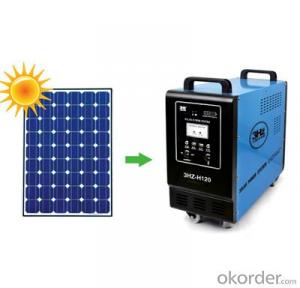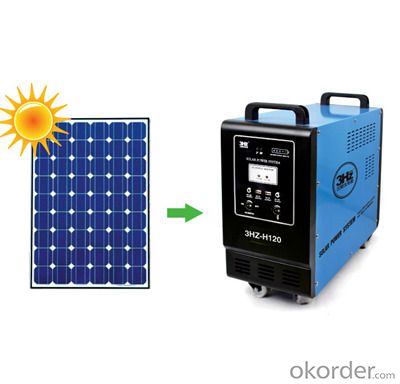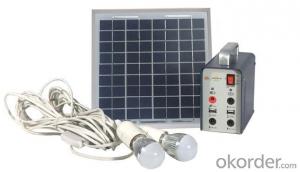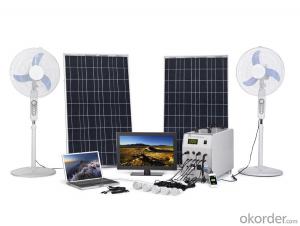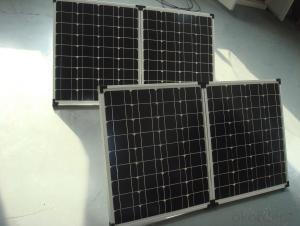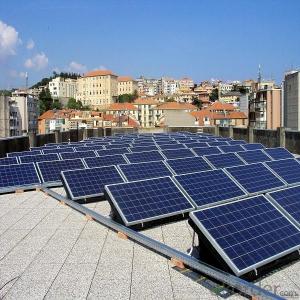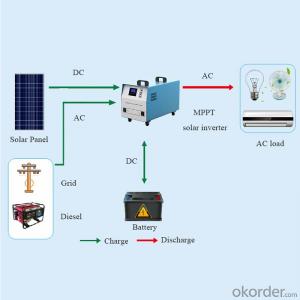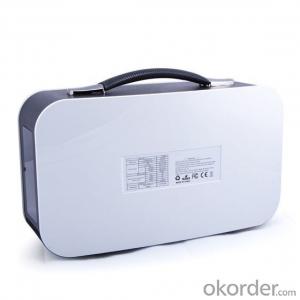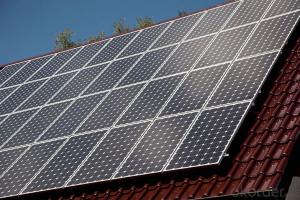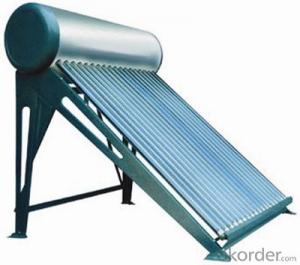150W Cheap Solar Energy Systems Portable Solar Power Generator
- Loading Port:
- China Main Port
- Payment Terms:
- TT OR LC
- Min Order Qty:
- -
- Supply Capability:
- -
OKorder Service Pledge
OKorder Financial Service
You Might Also Like
Specifications
1, 150W Solar Power System.
2, Power rating 300W for home devices.
3, Life span: 15 years.
4, Warranty: 12 months.
150W Solar Power System
1. Functions:
1) This model equipts with high efficiency charge and discharge controlling, over current protection.
2) Direct current output
a. Four plug contacts of DC12V / 20A output, could be used for DC lamp, DC fan, DC refrigerator, etc.
b. With DC9V / 30A and DC5.5V / 500mA output, could be used to charge cell phone, digital camera, music players, etc.
3) Alternating current output
Pure sine wave in 50Hz, continuous power 300W, peak power 600W, could be used to run household appliances like television, computer, fan, icebox, lights, etc.
4) LCD indicator
Showing battery voltage, battery capacity, charging current, inverter working states.
2. System configuration:
1) Poly or mono solar pane: 18V / 150W, 15 years lifespan.
2) Maintenance-free lead-acid batteries can be deep-discharge. 80AH, 12V, three-year lifespan.
3)Pure sine wave inverter. Input: 300W, output: AC 220V / 50Hz.
4) Controller: 12V, 20A
3. User manual:
1) Install the solar panel properly, and connect the solar panel by plug in ‘solar input’on the control box.
2) Operation panel manual
a. Controller’s working states will be showed on the LCD. First line: battery voltage. Second line: charging current. Third line: current battery volume. Fourth line: inverter’s working status.
b. Switch ‘power’ on to start controller, every output outlet works properly.
c. Start AC 220V output by switch ‘inverter’ on, which is fit for AC electrical appliances within 300W. Can be used for most of the digital products through an adapter.
d. It is recommended turning off the back screen light if you don’t need it by press ‘LCD Backlight, this will help to save the power.
4. Notes:
1) Output voltage and current are marked on the panel, overload is prohibited.
2) Keep this product away from rain or water.
3) Charge the battery for 24 hours before the first use, or the product may not work properly for running out of battery during long distance transportation.
3) When you got this product, please fully charge the battery before using. It may not work since over-discharge in long time transportation.
4) To change the battery, please note the battery cable prohibit reverse. Correct wiring should be: the red line connect with the battery anode, black one connects with the battery negative.
5) Please read this manual carefully before using
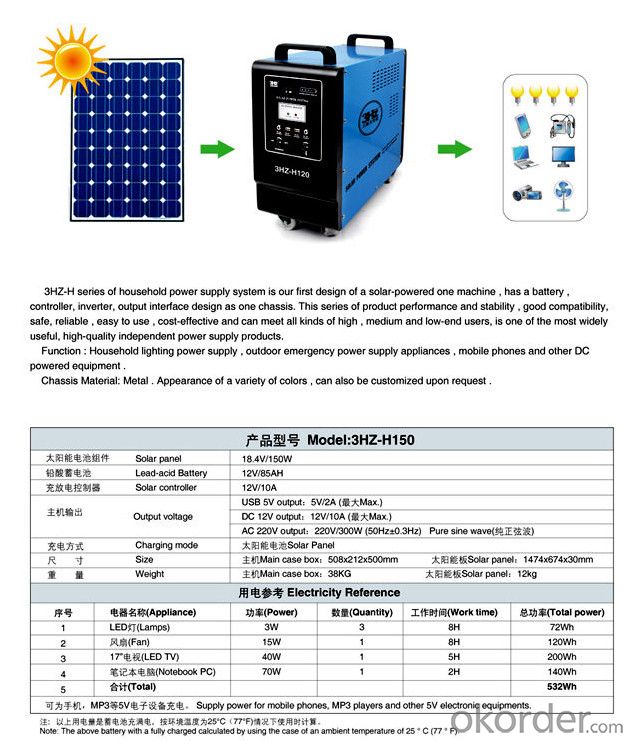
- Q: How do solar energy systems impact the local economy?
- Solar energy systems can have a positive impact on the local economy in several ways. Firstly, they create job opportunities in the installation, maintenance, and manufacturing sectors, boosting employment rates and income levels in the community. Additionally, solar energy systems reduce energy costs for businesses and households, freeing up funds that can be spent on other goods and services within the local economy. Moreover, the adoption of solar energy can attract investment and stimulate economic growth, as it demonstrates the region's commitment to sustainable development and renewable energy. Overall, solar energy systems can contribute to a more resilient and prosperous local economy.
- Q: Can solar energy systems be used in areas with high wind conditions?
- Indeed, areas with high wind conditions can utilize solar energy systems. Although solar energy systems mainly depend on capturing sunlight to produce electricity, they can still operate efficiently in areas with high wind conditions. Solar panels are specifically engineered to endure diverse weather conditions, including strong winds. They are usually securely mounted to withstand the wind's force. Moreover, wind conditions can positively influence solar energy generation. The wind aids in cooling down the solar panels, thereby enhancing their efficiency and overall output. Consequently, areas with high wind conditions can derive advantages from the installation of solar energy systems.
- Q: Can solar energy be used during power outages?
- Yes, solar energy can be used during power outages. Solar panels, also known as photovoltaic (PV) systems, convert sunlight into electricity. When connected to a battery storage system, excess solar energy can be stored and used when there is no sunlight available, such as during power outages. These battery systems can provide a reliable source of electricity, allowing essential appliances and devices to continue running even when the grid is down. Additionally, solar-powered generators can also be used during power outages to provide a temporary source of electricity. Overall, solar energy systems offer a reliable and sustainable solution to power outages, providing electricity even when the traditional power grid fails.
- Q: Can a solar energy system be installed on a community center or clubhouse?
- Certainly, it is entirely possible to install a solar energy system on a community center or clubhouse. As a matter of fact, community centers and clubhouses are prime locations for solar installations due to their expansive roof spaces and considerable energy consumption. By placing solar panels on the roof of a community center or clubhouse, the facility can effectively generate clean and sustainable electricity to fuel its operations. The utilization of solar energy systems can contribute to the reduction of electricity bills, the mitigation of carbon emissions, and the advancement of sustainable development within the community. Moreover, by integrating solar panels with battery storage systems, any surplus energy generated during daylight hours can be stored and utilized during the night or during periods of high demand. All in all, the installation of a solar energy system on a community center or clubhouse serves as an excellent opportunity to exhibit environmental leadership and inspire others within the community to adopt renewable energy.
- Q: Can solar panels be used in military operations or remote military outposts?
- Yes, solar panels can be used in military operations or remote military outposts. They provide a reliable and sustainable source of energy in remote locations where traditional power sources may be limited or unavailable. Solar panels can help power various equipment and infrastructure, including communication systems, lighting, surveillance equipment, and even charging stations for electronic devices. Their use in military operations can reduce dependence on fuel and logistical supply chains, making them a cost-effective and environmentally friendly solution.
- Q: What are the advantages and disadvantages of small-scale solar power generation system?
- Solar power has no moving parts, is not easy to damage, simple maintenance, especially suitable for unattended use; solar power will not produce any waste, no pollution, noise pollution, no adverse effects on the environment, is the ideal clean energy; solar power system short construction period, convenient and flexible, and can according to the load or, add or reduce photovoltaic capacity, avoid waste.
- Q: How can I find a reputable solar energy system installer?
- To find a reputable solar energy system installer, you can follow these steps: 1. Research and educate yourself: Begin by learning about solar energy systems, how they work, and the types of installations available. This will help you understand the basics and make informed decisions during the selection process. 2. Ask for recommendations: Reach out to friends, family, colleagues, or neighbors who have already installed solar systems. Inquire about their experience with the installer they hired, the quality of the work, and any potential issues or concerns they faced. Recommendations from trusted sources can be valuable in finding reputable installers. 3. Check credentials and certifications: Ensure that the installer you are considering has the necessary licenses, certifications, and insurance to carry out solar installations. Look for certifications from reputable organizations such as the North American Board of Certified Energy Practitioners (NABCEP) or the Solar Energy Industries Association (SEIA). 4. Research online reviews and ratings: Explore online review platforms, such as Google, Yelp, or Angie's List, to read customer reviews and ratings about different solar installers in your area. Pay attention to recurring positive or negative feedback and consider the overall reputation of the installer. 5. Obtain multiple quotes: Reach out to several solar installers and request detailed quotes for your specific project. Take note of the equipment they propose, warranties offered, pricing, and any additional services included. This will allow you to compare different installers and make an informed decision. 6. Ask for references and past projects: Request references from the installer to speak with previous customers about their experience. Inquire about the quality of work, timeliness, customer service, and any issues encountered. Additionally, ask the installer for examples of past projects they have completed to evaluate their workmanship and attention to detail. 7. Evaluate warranties and post-installation services: Inquire about the warranties provided by the installer for both the equipment and the installation work. A reputable installer will offer comprehensive warranties to ensure the longevity and performance of your solar system. Additionally, ask about any post-installation services they provide, such as maintenance, repairs, or monitoring. 8. Get multiple opinions: If you encounter any doubts or concerns during the selection process, don't hesitate to seek a second opinion from another reputable installer. This can help you gain further clarity and confidence in your decision. Remember, finding a reputable solar energy system installer is crucial for the long-term success and performance of your solar system. Take your time, do thorough research, and choose an installer that aligns with your needs, budget, and values.
- Q: Can solar energy systems be used for drying agricultural produce?
- Yes, solar energy systems can indeed be used for drying agricultural produce. Solar dryers, such as solar air dryers or solar dehydrators, utilize the energy from the sun to dry agricultural products efficiently and naturally. These systems typically involve capturing sunlight using solar panels or collectors, which then heat up the air inside the dryer. This heated air is circulated over the produce, facilitating the drying process. Solar drying is a sustainable and efficient method that can preserve the quality of agricultural produce while reducing reliance on fossil fuels.
- Q: Can solar energy systems be used in conjunction with battery storage?
- Yes, solar energy systems can be used in conjunction with battery storage. This combination allows for storing excess energy produced by solar panels during the day and using it during periods of low or no sunlight. Battery storage helps provide a continuous power supply, reduces reliance on the grid, and enhances the efficiency and reliability of solar energy systems.
- Q: Are solar energy systems noisy?
- No, solar energy systems are not noisy. They do not produce any sound while generating electricity from sunlight.
Send your message to us
150W Cheap Solar Energy Systems Portable Solar Power Generator
- Loading Port:
- China Main Port
- Payment Terms:
- TT OR LC
- Min Order Qty:
- -
- Supply Capability:
- -
OKorder Service Pledge
OKorder Financial Service
Similar products
Hot products
Hot Searches
Related keywords
